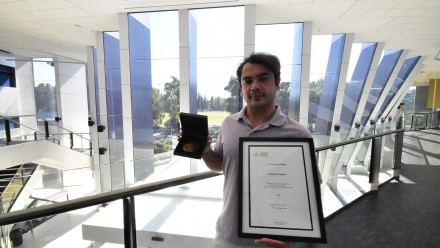T cell receptor clustering - a mechanism of signal transduction
Professor Katharina Gaus, EMBL Australia Node in Single Molecule Science and ARC Centre of Excellence in Advanced Molecular Imaging, University of New South Wales, Sydney, Australia
Antigen recognition by the T cell receptor (TCR) is a hallmark of the adaptive immune system. When the TCR engages a peptide bound to the restricting major histocompatibility complex molecule (pMHC), it transmits a signal via the associated CD3 complex. How the extracellular antigen recognition event leads to intracellular phosphorylation remains unclear. We use single-molecule localization microscopy and novel analysis to quantify the organization of TCR-CD3 complexes into nanoscale clusters and to distinguish between triggered and non-triggered TCR-CD3 complexes. We found that only TCR-CD3 complexes in dense clusters were phosphorylated and associated with downstream signaling proteins, demonstrating that the molecular density within clusters dictates signal initiation. Both pMHC dose and TCR-pMHC affinity determined the density of TCR-CD3 clusters, which scaled with overall phosphorylation levels (Pageon et al. PNAS 2016). We also developed novel FRET sensors to monitor the rate of receptor clustering (Ma et al. Nat Commun 2017) and a sensor that reports membrane charges (Ma et al. Nat Biotech 2017). With the latter, we examined the role of membrane charges in TCR clustering and signal induction. In summary, we propose a model in which antigen recognition is first translated into receptor clustering and then the density of receptor nanoclusters is translated into signaling. This model may explain how T cells can respond to both the affinity and dose of pMHC molecules with a common signal transduction mechanism.
Scientia Professor Katharina Gaus is an NHMRC Senior Research Fellow at the University of New South Wales and Head of the EMBL Australia Node in Single Molecule Science. She is also the Deputy Director of the ARC Centre of Excellence in Advanced Molecular Imaging (2014-2020). Katharina received her PhD from the University of Cambridge in 1999 and has led an independent research group since 2005. Her group investigates signal transduction processes in T lymphocytes with advanced fluorescence microscopy approaches. She was awarded the Young Investigator Award from the Australia and New Zealand Society for Cell and Developmental Biology (2010), the Gottschalk Medal from the Australian Academy of Science (2012), the New South Wales Science and Engineering Award for Excellence in Biological Sciences (2013) and the Khwarizmi International Award (2018).












